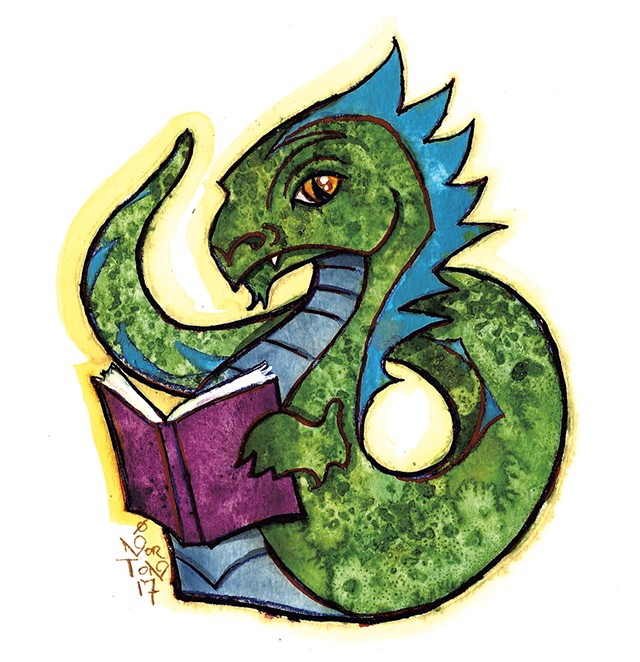
- Susan Norton
Wandisson Charles burst into a small Mann Hall classroom on the University of Vermont campus with the exuberance of a second grader.
"One-oh-two, teacher!" the 20-year-old exclaimed in greeting his English instructor, Chaska Richardson.
"One-oh-two?!" Richardson replied without missing a beat. In carefully constructed English, Charles was telling her how fast he'd thrown a baseball during a game the previous night — Sunday, August 20. The 6-foot, 6-inch-tall Dominican man is a starting pitcher for the Vermont Lake Monsters.
There were fist bumps all around and greetings in slang-laden Spanish as Charles and three other players found seats at tablet desk chairs. It was the last class of the year for this Latino contingent of the Lake Monsters, Vermont's only professional baseball team.
They had a game scheduled for that evening against the Connecticut Tigers and, come September, would be headed for the playoffs. As of press time, the team was leading its division in the New York-Penn League with a record of 37 wins and 29 losses.
Winning isn't everything, though: The players seemed genuinely disappointed when Richardson reminded them they wouldn't be meeting again.
"Nooo," Charles groaned.
The Vermont Lake Monsters are part of the major-league Oakland Athletics' "farm system," comprised of developmental teams for less-skilled, often younger, players. The Athletics hire the Higher Standards Academy to teach English language and cultural skills to players, many of whom have been newly signed and are away from their home countries for the first time. The organization offers the program to its lower-level farm teams and added the Vermont class this spring.
The group had been meeting a few times per week — about 20 sessions total — since the season began on June 19, fitting in hourlong classes between stretches of away games.
At Richardson's request, the students obligingly introduced themselves to a reporter in halting English: Charles, a muscular pitcher from Baní, Dominican Republic; Jesus Lage, a speedy 19-year-old shortstop who hails from Valencia, Venezuela; 19-year-old pitcher Oscar Tovar, who had a wife — but "no babies yet" — waiting for him at home in Venezuela; and pitcher Abdiel Mendoza of Chitré, Panama, who, at 18 years of age, earned constant ribbing for his status as the youngest member of the team.
The other regular class member, Colombian pitcher Jean Ruiz, was absent. He was at home napping ahead of his scheduled start that night.

- Courtesy Of Vermont Lake Monsters
- Left to right: Wandisson Charles, Jesus Lage, Abdiel Mendoza, Jean Ruiz, Oscar Tovar
Richardson had a special-edition "Jeopardy!" game prepared to celebrate the final class. Categories included Vermont, baseball positions, body parts, food, money and famous baseball players.
Richardson communicated only in English, though the students were quick to lapse into Spanish chatter. They teased each other good-naturedly, like brothers. The game quickly turned competitive as they scoffed at easy questions and yelled responses out of turn.
Charles was able to name three things he was wearing — T-shirt, shoes and shorts — and Mendoza listed his favorite food: "rice and chicken."
Lage could point out Vermont on a map, and players remembered the name of Lake Champlain — with some prodding from Richardson.
The "famous player" category claimed their full attention: "This player comes from the Dominican Republic. He can throw his fastball 102 miles per hour," Richardson read from the screen. "Who is it, Charles?"
"Uh, me, teacher — yo," he said with a grin.
"La Piedra," his nickname, flashed on the projector screen, and Charles' classmates burst into guffaws. Tovar snapped a cellphone photo of the screen.
"You guys learned so much," Richardson told her students approvingly. "In June, you guys did not know any of these answers."
Richardson, of Huntington, specializes in teaching English as a second language. During the year, she teaches New Americans in Burlington elementary schools.
"I don't speak any Spanish, but I'm learning a lot from these guys," she said at one point during class. "I know: 'La Piedra,' 'Malandro,' 'El Capo'" — the players' nicknames for each other, which in English mean "the rock," "thug" or "rascal," and "mafia leader," respectively. "And 'O cielos,'" she added, to laughs from her students — "oh, heavens."
Richardson knew little about the players when she first started teaching them. But in one class, they talked about their earliest memories. All had to do with baseball, she said — playing catch or a first trip to the ballpark.
Most of the nine Hispanic Lake Monsters were signed around 2015, said Paul Stanfield, director of media relations for the team. Typically, players spend a season or two in the Dominican Summer League before a stint at the Arizona Rookie League, which is a precursor to the Single-A short-season Lake Monsters.
Lage followed that path. The Oakland Athletics picked up the Venezuelan as the result of a player showcase in Minnesota. He's spent the last couple of years bouncing between Arizona and Vermont.
Young Mendoza spent last summer in the Dominican league before landing a job this spring with the Beloit Snappers in the Single-A Midwest League. Coming to the Lake Monsters for the start of the season was considered a demotion. In the farm system that players must ascend to reach the majors, the Lake Monsters are near the bottom of a ladder with many rungs.
The players make sacrifices to get a shot at climbing it. They spend a significant chunk of the year away from their families, surrounded by a new language and culture, and making little pay — about $1,000 a month, according to Stanfield, or about $5,000 to $6,000 for the season. Most are in their teens or early twenties.
They live with host families, whom players pay a small monthly stipend. Three of the four attending class, along with Ruiz, live with one family in Winooski. They call their host parents "Mom" and "Dad" because they don't know their full names, Richardson said later.
"They always host the Latinos," her pupils explained to this reporter in Spanish. "La señora is always smiling," one said. "Not the man."
Come next spring, most of the current team will move on to a full season Single-A Athletics' affiliate, either in Wisconsin or California. But success isn't guaranteed; about seven or eight will return for a second season with the Lake Monsters, Stanfield said. A couple may be sent back to Arizona, or even back home.
"They usually have only four years to really make it" to the big leagues, noted Linda Wawrzyniak, the Higher Standards Academy founder and president.
All that moving around makes it difficult to study a foreign language: Richardson's class began with 14 students but dwindled to five over the course of the season. A few had been demoted to the Arizona Rookie League, she said. Others had left the class as their English improved.
"We don't have 12 years to teach them English, so we have to focus on what's more important and when it's most important," said Wawrzyniak.
According to Richardson, most of her students had between an eighth- and 10th-grade-level education. Her teaching emphasized the basics: money, shapes, body parts and baseball lingo.
Richardson said she also taught "a sense of place." She worked in the legend of the lake monster Champ and used a map to show the cities where the players traveled for away games. They learned the names of the pitches they'd be seeing at bat— sliders and four-seam fastballs — and words for Vermont weather and seasons. This summer, which started off cold and rainy, was a popular conversation topic.
The "Jeopardy!" game also proved an effective engagement tool. Cleats go on your feet, the players recalled, raising their voices over each other. An umpire calls people safe or out. The name of their ballpark? Centennial Field. They'd be walking there shortly to warm up for their 7 p.m. game. They anticipated a big crowd for the 25-cent hot dog night promotion.
At the end of class, Richardson handed out Vermont-related mementos as prizes: a snow globe, playing cards with Vermont images, a pencil with a moose on the end. As they filed out, the players hugged Richardson.
"I'll see you at the ballpark," she told them. "Keep talking, OK? Don't stop talking!"
"For them, the stakes are really, really high," Richardson said of their budding baseball careers as the players departed, noting their "amazing" work ethic.
"It's what all their peers at home are dreaming about."










Comments
Comments are closed.
From 2014-2020, Seven Days allowed readers to comment on all stories posted on our website. While we've appreciated the suggestions and insights, right now Seven Days is prioritizing our core mission — producing high-quality, responsible local journalism — over moderating online debates between readers.
To criticize, correct or praise our reporting, please send us a letter to the editor or send us a tip. We’ll check it out and report the results.
Online comments may return when we have better tech tools for managing them. Thanks for reading.